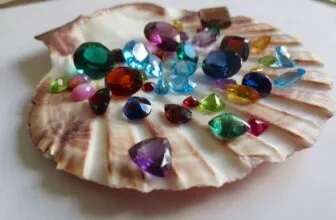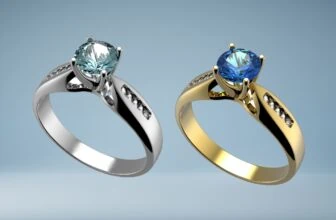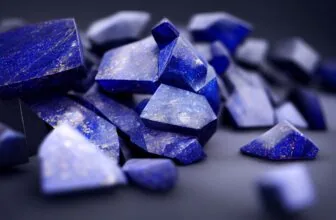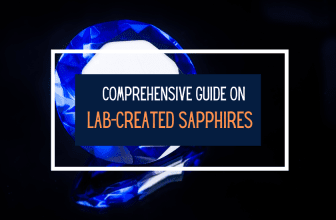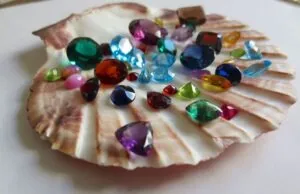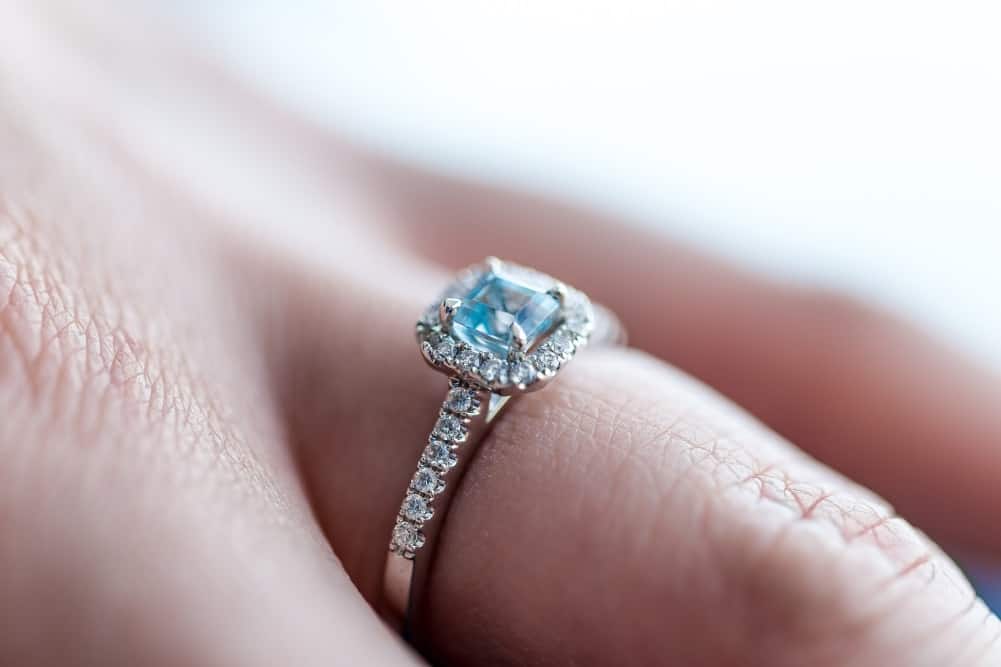
Table of Contents
As Jewelry Shopping Guide editors, we write about things that we love and we think you’ll like too. We often have affiliate partnerships, and may generate some revenue from these links at no cost to you.
Zircon is a little-known and often misunderstood stone. While not many people know of this gemstone today, zircon used to be highly valued and coveted throughout history for its natural sparkle and attractive features. It is a beautiful natural gemstone, comparable in many ways to diamonds.
Zircon is the oldest mineral found on earth so far, with some crystals found in Australia estimated to be over 4.4 billion years old!
Because of its similarities in appearance to diamonds, zircon was the first natural diamond simulant. It is the only natural gemstone that even comes close to imitating the appearance of a diamond. Unfortunately for zircon, many people confuse zircon with the cheaper, less valuable cubic zirconia, which has given it some bad rep. however, it is a beautiful gemstone in its own right.
If you’re intrigued by this misunderstood stone, keep reading as we cover everything you need to know about zircon.
What is zircon?
Zircon is a natural gemstone. It is composed of zircon silicate and is found in a number of regions around the world, including Sri Lanka, Burma, Cambodia, USA, South Africa and Australia. It has been used in jewelry for centuries and particularly as a diamond simulant.
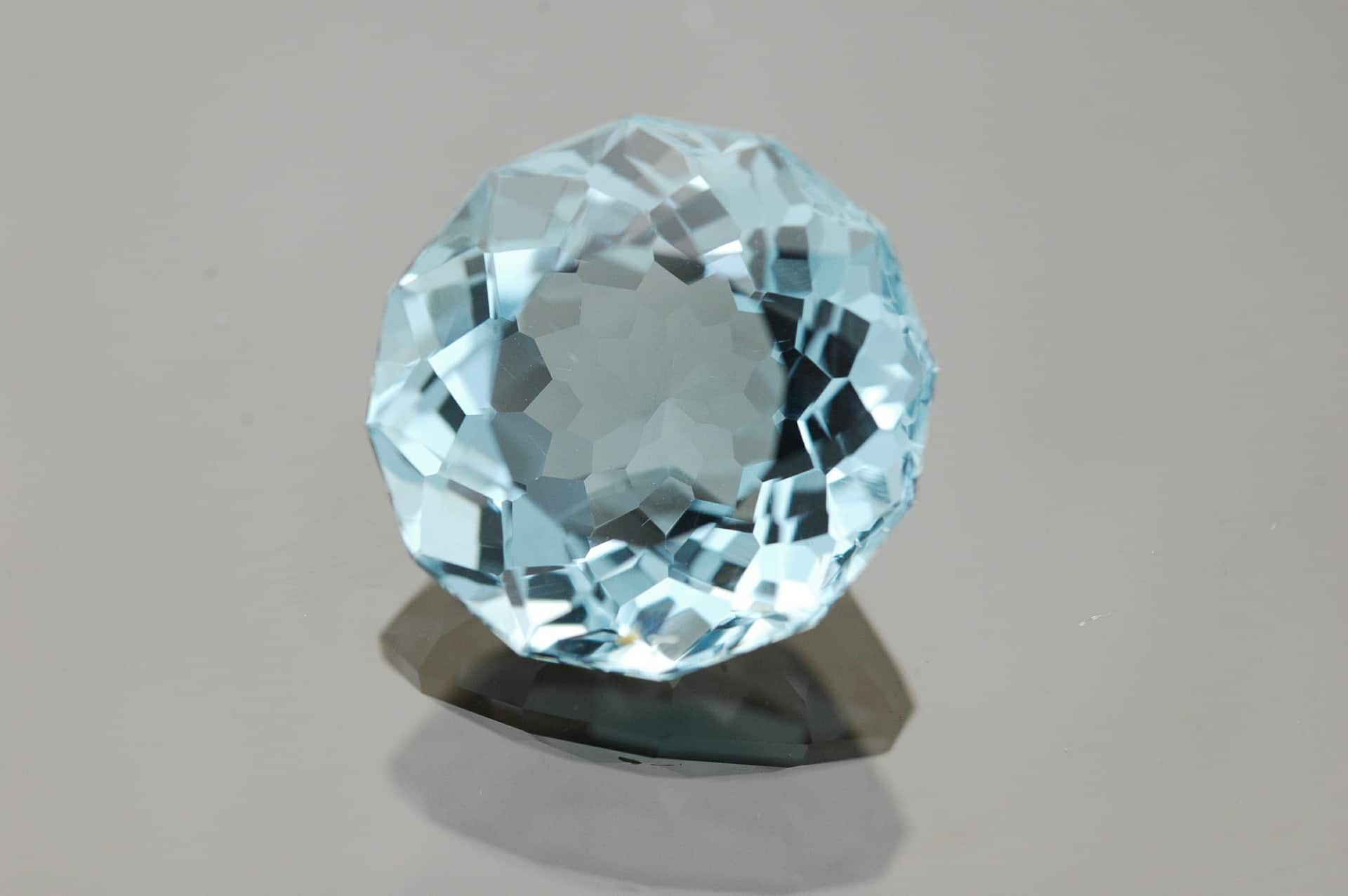
The word zircon comes from the Persian word ‘zargun’ meaning ‘gold-colored’. However, you can find zircon in a range of colors, caused by various impurities that are present during the formation of the stone. Sometimes zircon can contain traces of uranium, and can be slightly radioactive. In such cases, the zircon undergoes stability treatments to enable them to be used in jewelry.
However, don’t let this stop you from adding zircon to your jewelry collection because the miniscule levels of radioactivity found in zircon jewelry pose no health risks for humans.
Zircon has very high sparkle, luster, dispersion and refraction. In other words, it plays excellently with light, making it a brilliant and fiery stone. Zircon also exhibits rainbow flashes of color.
Because the stone has double refraction, it displays excellent fire and may give off the illusion of having double the number of facets that it actually has. This birefringence, however, can also cause the zircon to appear fuzzy.
Evaluating zircon color
While the most popularly used zircon varieties include blue, pink, yellow and colorless, you can find this stone in almost every color.
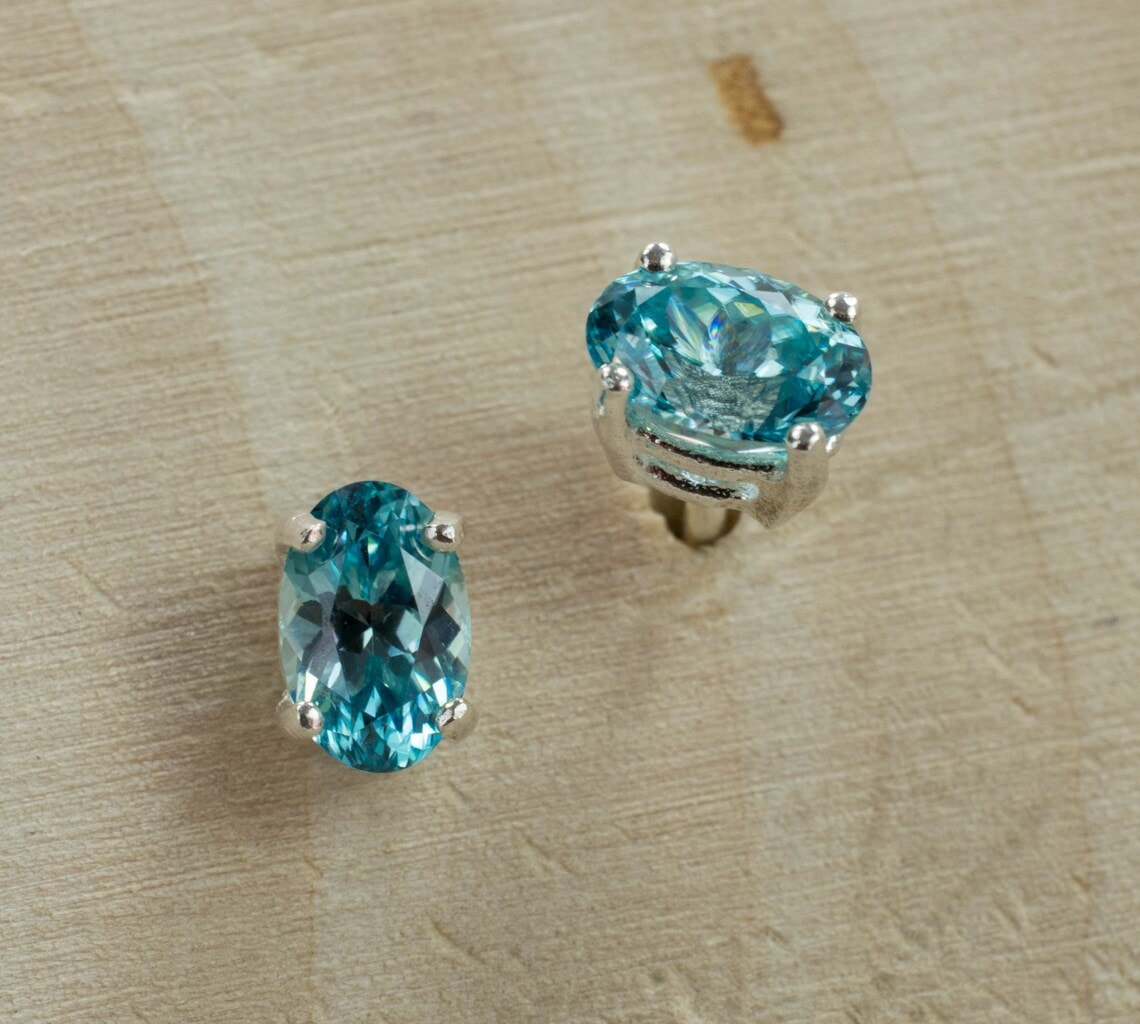
Colorless zircon is the purest form of the mineral and high quality, diamond-like stones can be very rare. In fact, it is much rarer than diamonds but is considerably less valuable.
Blue is the most valuable zircon variety and among the most sought after. However, natural blue zircon is difficult to come by, so many blue stones on the market have been heat-treated to obtain the signature zircon pastel blue shades.
Of all the zircon colors, green is highly coveted because they happen to be the rarest variety of zircon. It is a collector’s item and is very rare to come by.
Some zircon stones can also display pleochroism. This is the ability of the stone to display two or more colors, depending on the angle at which the stone is viewed. Blue and green are the two commonly exhibited colors, resulting in a teal like color.
Choosing your zircon cut
Because of zircon’s high dispersion and light performance, cutting colorless zircon into a brilliant shape usually maximizes its luster and makes it appear very similar to diamonds. Faceting is another way to enhance the light performance of zircon and you will often find these stones expertly faceted in a number of angles.
Other popular shapes for zircon include emerald step, ovals, rounds, pears, marquises, trilliants and radiants.
Choosing zircon clarity
Zircon generally has very high levels of clarity. Most zircon on the market is eye clean. However, it is a natural gemstone and as such, slight impurities and flaws are common, often visible via magnification.
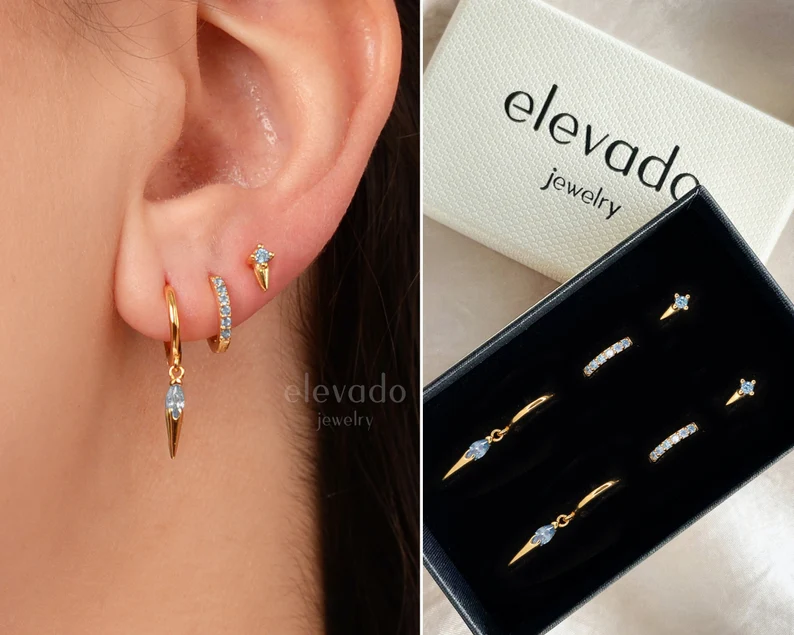
Most zircon gemstones are transparent or translucent, and has a vitreous luster. Sometimes zircon is heat treated to enhance its transparency. Zircon with higher transparency are more valuable and sought after for jewelry.
Carat weight of zircon
Most zircon gemstones are found in small sizes. Larger stones are rare to come by and can command higher prices.
Interestingly, zircon happens to be one of the densest gemstones of all. What this means is that it will be smaller in size to another gemstone of the same weight, as it is much heavier. If you compare the weight of a zircon and a same-sized diamond, you’ll find that the zircon weighs approximately 50% more than the diamond.
Zircon stone price
Although some varieties of zircon is much rarer than diamonds, the price of these stones are generally much less expensive. This means that you can get an amazing stone for a good price, making zircon a great option for jewelry.
Zircon can cost anywhere around $50 to $400 per carat, depending on the quality factors of the stone. You’ll need to evaluate the stone and ensure that it is worth the asking price.
It is best to compare the zircon prices from different vendors before you buy, to ensure you are getting a good deal.
Zircon vs. Diamonds
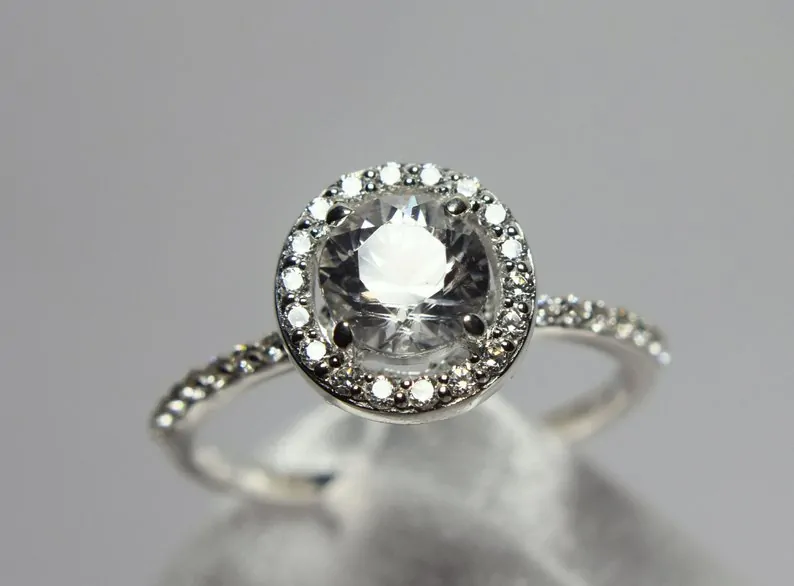
As we’ve mentioned a couple of times already, zircon is a famous diamond simulant and is the only naturally occurring gemstone that is so similar in appearance to diamonds. Distinguishing a high-quality, well-cut zircon from a good diamond can be very difficult to do.
The main distinguishing feature between zircons and diamonds is the double refraction that zircon exhibits. Diamonds are singly refractive.
Because zircons are a lot less expensive than diamonds, they make an excellent natural substitute.
Zircon vs. Cubic Zirconia
Most people confuse zircon for cubic zirconia (CZ). This confusion is understandable; after all, both stones closely resemble diamonds and share a very similar sounding name.
But that is where the similarity ends.
Zircon and cubic zirconia are two very different gemstones. Chemically, optically and structurally, zircon and cubic zirconia don’t share any similarities.
Unfortunately for zircon, this confusion with a cheaper diamond substitute has affected its reputation, making it too appear like a cheap diamond alternative.
Here are some of the main differentiating factors between cubic zirconia and zircon:
- Origin – Zircon is a natural mined gemstone and is over 4.4 billion years old. Natural cubic zirconia, on the other hand, was discovered relatively recently (around the 1930s) and was then synthesized. All CZ found on the market is synthetic, meaning that it is man-made in labs using technology.
- Structure – Zircon is a composition of zirconium silicate whereas CZ is the cubic crystalline form of zirconium dioxide.
- Price – While there are many factors that influence the value of a zircon, zircon is more expensive than cubic zirconia, among the cheapest diamond simulants out there. Also, being a natural gemstone, zircon is more valuable.
- Hardness and durability – Cubic zirconia has a high hardness rating of 8 to 8.5 on the Mohs scale. This makes it a suitable stone for daily usage and able to withstand rough wear and tear. Zircon on the other hand, is a much softer gemstone ranking at around 6 to 7.5. It is a brittle stone and can easily be scratched or chipped if exposed.
CZ is a great option if you want an affordable stone with high wearability. Zircon is more a collector’s choice, a beautiful gemstone to add to your jewelry collection and admire. To read more about zircon vs. cubiz zirconia, check out our article here:
Zircon treatments and enhancements
Most zircon on the market is often untreated. However, sometimes heat treatments are used to enhance or change the color of zircon.
Much of the blue zircon found on the market is acquired by heat treating less desirable and more commonly found brown zircon.
You can find synthetic zircon as well, but these are not very common. While it’s a common industry practice to heat treat gemstones, the retailer must disclose this information when selling their gemstones. Always ask prior to purchase whether the stone has been heat treated. Untreated gemstones are considered of higher quality and are almost always more expensive.
Zircon in jewelry
Zircon is beautiful for both men’s and women’s jewelry because it has a range of hues to choose from. Colored zircon adds that perfect pop of color to your outfit and can energize your wardrobe.
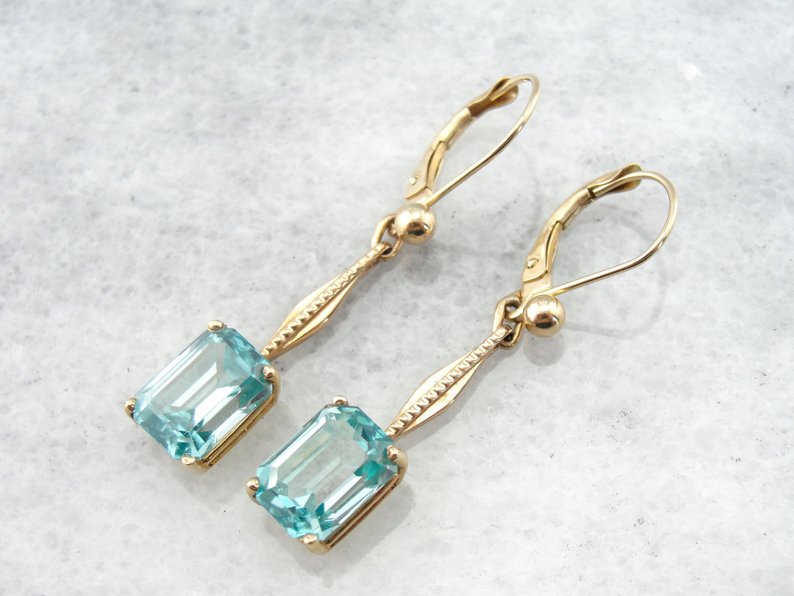
Because of its stunning hues and flashes of color, a little zircon can go a long way. If you want a statement look, then choose large zircon jewelry. However, for everyday casual and workwear, a small dainty zircon will be ideal.
Zircon is durable enough for regular wear and because of its relative affordability, makes for excellent jewelry.
For a zircon ring, it is recommended to choose a protective setting such as bezel or flush, in order to prolong the life of the stone. You have to wear it carefully to prevent it from damage (more on this below).
For pendants or earrings, this is less important as these items don’t face as much harsh exposure as rings.
Is a zircon engagement ring a good idea?
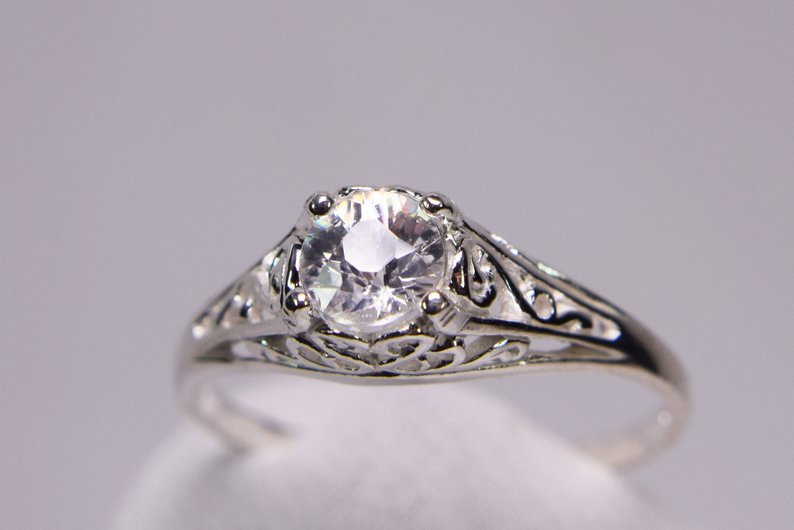
Because of its similarity to diamonds, zircons are often chosen as a diamond substitute for engagement rings. However, when choosing a gemstone for an engagement ring, you have to think beyond its appearance.
Is the stone durable enough for daily wear and how will it hold up to daily exposure and rough treatment?
Unfortunately, zircon is a soft gemstone (more on this below) and can easily get damaged and scratched. With careful maintenance a zircon engagement ring can last a long time, but be prepared to give it more attention than a harder gemstone, like diamonds, sapphires or rubies.
Taking care of zircon
Zircon may look very much like a diamond, but it is a much softer stone at 6 to 7.5 on the Mohs scale. Incidentally, 7 is the most important number on the Mohs scale because that is the hardness rating of silica, commonly found in dust particles. This means that a zircon below 7 can be easily scratched by dust.
Zircon is also a very brittle stone, and is easily damaged or chipped if exposed to hard knocks and rough wear.
It is recommended to avoid using ultrasonic or steam cleaners when cleaning zircon. Instead, use a commercial jewelry cleaner or soap and warm water with a soft brush. Once washed, rinse the zircon stone in clean water and dry it well.
When storing zircon, wrap in a cotton or velvet cloth. This keeps it free from dust and from being scratched by other items.
Zircon is extremely sensitive to sunlight and other sources of ultraviolet light. Avoid exposing your zircon jewelry to these types of light as it can cause the color of the stone to fade or change.
Keep zircon away from chemicals such as harsh detergents, bleach and cosmetics. It is always better to take off zircon jewelry when applying makeup and when doing household or outdoor activities that will expose it to chemicals.
Zircon symbolism and lore
Zircon is the traditional birthstone for December born babies.
In mediaeval times, people believed that zircon would assist the wearer to sleep. It was also believed to bring wealth, wisdom and knowledge to the owner. It was also believed to assist healing with a range of physical problems, such as blisters, sores and varicose veins.
Today, many people value zircon as a crystal that brings a healing energy and mental, physical and spiritual balance. It is said to promote and foster confidence, compassion and strength. Zircon is seen as a grounding stone, that stimulates your purpose and helps you to reach your goals, and to keep motivated and inspired without losing your focus.
*Disclaimer: Jewelry Shopping Guide does not guarantee or validate any of the claims related to the metaphysical and alternative healing powers of this or any other gemstone. This information should in no way be used as a substitute for medical advice.
Where to buy zircon
Zircon can cost anywhere around $50 to $400 per carat, depending on the quality factors of the stone. It is best to compare the zircon prices from different vendors before you buy, to ensure you are getting a good deal.
Taking your zircon search online will give you more options, as most brick-and-mortar stores may not have zircon in stock as it is not a commonly known gemstone.
Many beautiful zircon jewelry pieces can be found on artisan stores such as on Etsy. Ensure that the retailer is reputable and communicates with you effectively and honestly about their jewelry. Ask about any treatments that may have been done on the stone. Your vendor should disclose this information to you honestly.
Always check the after sales service and returns policy, in case of any issues.


